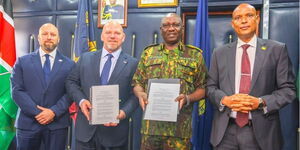Journalist Who Left TV Job to Save Lives
Joseph Murimi Nyambura is a man on a mission, using the challenges he encountered growing up, to give hope to those in the same situation or even worse than he faced.
“Somebody believed in me. It is now my turn to believe in others,” he says as he narrates how he left a TV job with the goal of making a lasting difference in society.
His goal, is to come to the aid of families who cannot access medical care due to financial constraints. He founded the Save a Life Foundation in 2010 where he has mobilised medical funds for over 900 people who are not in a position to access urgent medical assistance.
Despite not being wealthy, Murimi opened up to Kenyans.co.ke on what drives his philanthropic actions and why he chose to be a man dedicated to service to humanity, more so, the less fortunate in the community.
“When I was working in the mainstream media back in 2010, I met this needy child at Mathare slum who had a fracture on her arm and needed a surgery to have it fixed. She needed Ksh200,000, which the family could not raise since the mother was a single parent with two children to take care of on less than Ksh200 a day.
"This challenged me and I came up with the idea of fundraising for the girl. This is how I started a TV programme designed to fundraise for the sick who cannot afford their medical bills,” he explained.
Ten years later, the father of two has not relented on his mission, impacting over 700 families along the way.
“I have met people who I have helped raise funds for in the past - some as long ago as 2012, and they remember me, and appreciate what we did," he recalls.
Some days are better than others, especially when a follow-up on a case yields positive results. Success comes when the patients are healed and their families get into a better position to sustain themselves economically.
Such is the case for Elsie, a one-year-old baby who had a skin disease that covered her entire body. After highlighting her plight on social media, Kenyans raised funds for her treatment at Muranga Hospital.
"Hers is a story to celebrate and we thank God. Three months down the line, the baby is completely healed," Murimi updated his followers on social media.
{"preview_thumbnail":"/files/styles/video_embed_wysiwyg_preview/public/video_thumbnails/WoIXXcO1ZCA.jpg?itok=b-I2o8az","video_url":"","settings":{"responsive":1,"width":"854","height":"480","autoplay":0},"settings_summary":["Embedded Video (Responsive)."]}
Born and raised in Githurai, Murimi has also taken upon himself to empower the young people of Githurai by creating a hub for talent, growth and inspiration.
Through the foundation, Murimi has been able to save many young people from the shackles of drug and substance abuse and addiction as well as crime. The organization has opened its doors to many seeking refuge and those seeking a newer and clearer direction in life.
So far, Murimi's charity organisation has trained over 800 young people in film making, empowered over 1500 in computer literacy. Street children have not been left behind as the organization has been able to enroll over 80 kids for the street program that is designed to counsel and shed light on issues such as contraction of STDs, family planning as well drug abuse.
On the other hand, it is through this journey that he has learned that not everyone that they extend their generosity to will be grateful.
During their feeding program for street families, they have had cases where the beneficiaries ended up stealing or vandalizing, some of their equipment. He has learnt to be patient and to handle such situations gracefully.
"Oftentimes, the resources are not even close to enough. Some people want to join thinking there is a lot of money we rake in, only to find that, on the contrary, we give, not receive. They end up quitting," he stated.
Murimi now teaches at PAC University, reveling in seeing young men and women go after their dreams under his tutelage. He is a senior studio technician at the university.
Since 2010, he has been teaching photography and videography to youthful minds and he believed they now have a better chance of building a productive future for themselves.
“My joy is sharing my skills with others, and currently we have a training hub at Githurai 45 and from the beneficiaries, there are a few who are now working in different organisations and a good example is one Omondi who trains the youth in Mathari and two working with UTV. One in scheduling while the other is in heading live production,” the jovial man adds.
Murimi hopes that he can reach more people and that more youths and empower them. He hopes to cover all of Kenya, make people buy his idea and make effort towards making one another better. He believes in always being ready to uplift and be conscious of the needs of others.
The philanthropist is married to Juliette and they have two girls, Promise and Peace. He remembers his mother and grandmother fondly. “My grandmother is a gem,” he says. “The sacrifices my mother made are immeasurable.”
He adds that it was under the example of these two women that he learnt the act of humility, generosity and service. Women who were always ready to help those in need with the very little they had.












